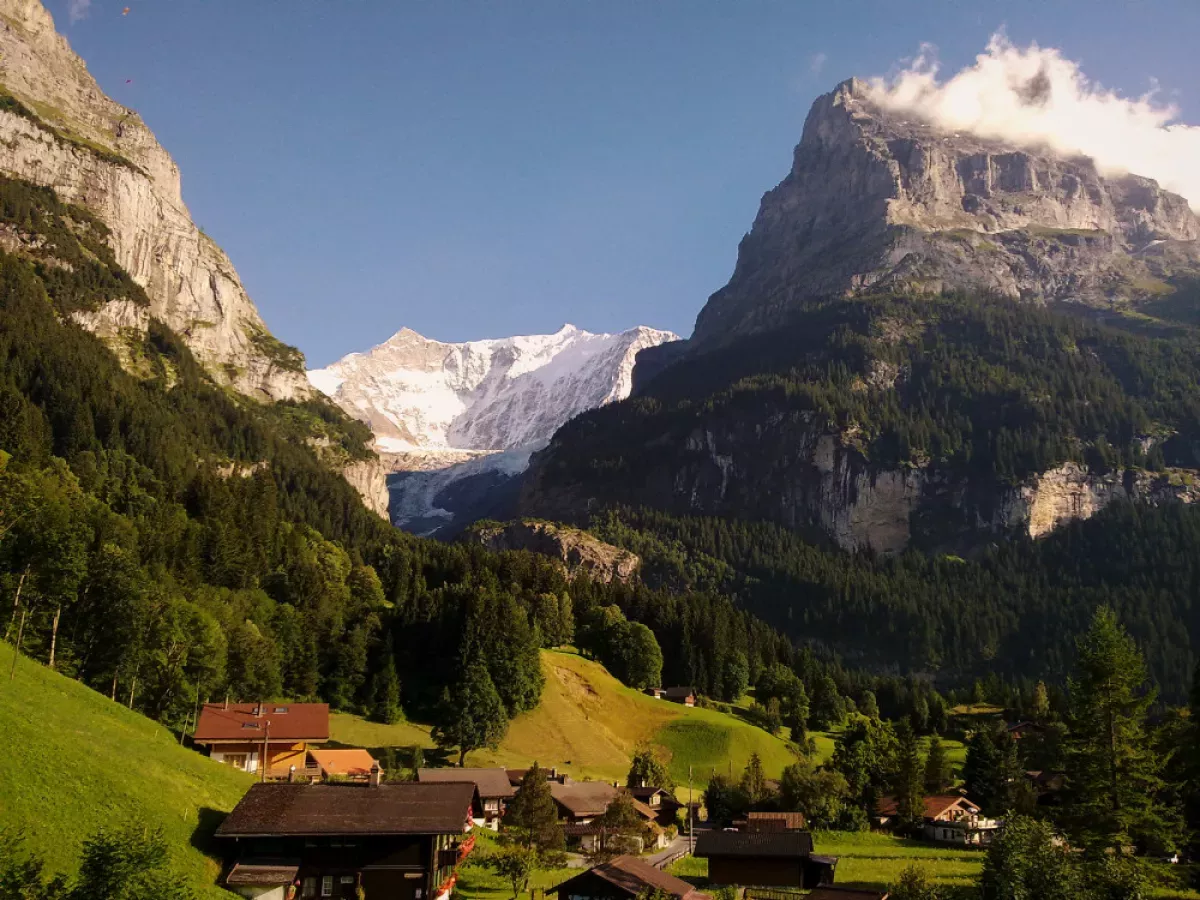Grindelwald is a Swiss village and municipality located in the Bernese Oberland region. Besides the main village, its territory encompasses various settlements like Alpiglen and Burglauenen. Grindelwald is situated within the Interlaken-Oberhasli administrative district in the canton of Berne.
1912: Expansion of the Rack Railway to Jungfraujoch
Connecting Grindelwald to the iconic Jungfraujoch, the rack railway was extended in 1912, further enhancing the accessibility of the region for tourists.
1912: Publication of "Alpine Studies" by W.A.B. Coolidge
W.A.B. Coolidge, a renowned English alpinist, published his comprehensive work "Alpine Studies" in 1912, contributing significantly to the understanding of the Grindelwald region.
1914: Rapid Growth of Hotels in Grindelwald
By 1914, Grindelwald experienced a boom in its tourism industry, with the number of hotels skyrocketing to 33, a significant increase from just 10 in 1889.
1938: Ascent of the North Face of the Eiger
The year 1938 marked a significant moment in mountaineering history with the successful ascent of the treacherous north face of the Eiger mountain.
1979: Start of UNESCO Research Program on Tourism Impact
In 1979, the Geographical Institute of the University of Bern initiated a research program under UNESCO's "Man and Biosphere" project. This study focused on analyzing the effects of tourism on the Grindelwald region, spanning from 1979 to 1984.
1981: Start of Climate Data Collection Period in Grindelwald
A period of climate data collection began in Grindelwald in 1981, aiming to understand the region's weather patterns and precipitation trends.
1984: Conclusion of UNESCO Research Program on Tourism Impact
The comprehensive research program initiated in 1979 by the University of Bern, investigating the impact of tourism in Grindelwald, concluded in 1984, providing valuable insights for sustainable tourism development.
2000: Population Change Analysis in Grindelwald
A review of the population trends in Grindelwald between 2000 and 2010 showed a slight decline of -1.3%, primarily attributed to a -1.7% change from births and deaths, slightly offset by a 0.2% increase from migration.
2000: Language Demographics in Grindelwald
According to data gathered in 2000, a significant majority of Grindelwald's population, 86.8%, spoke German as their primary language. Portuguese was the second most prevalent language at 4.5%, followed by French at 1.7%.
2000: Housing Statistics in Grindelwald
Housing data from 2000 indicated that Grindelwald had 1,581 permanently occupied apartments, representing 44.9% of the total housing units. Seasonally occupied apartments accounted for 49.6% (1,750 units), highlighting the significance of tourism. The remaining 5.5% (194 units) were vacant.
2000: Student Commuting Patterns
In 2000, a total of 20 students residing outside of Grindelwald attended schools within the municipality. Conversely, 39 students who were residents of Grindelwald commuted to schools located in other municipalities.
2008: Gender Distribution in Grindelwald
Demographic data from 2008 revealed a nearly even gender split in Grindelwald, with 50.1% of the population being male and 49.9% female.
2008: Full-Time Equivalent Jobs in Grindelwald
In 2008, there were 2,265 full-time equivalent positions in Grindelwald. The primary sector offered 165 jobs, while the secondary sector, mainly in construction, provided 365 positions. The tertiary sector, driven by tourism and hospitality, dominated with 1,735 jobs, emphasizing its role as the backbone of Grindelwald's economy.
2008: Employment Distribution Across Sectors in Grindelwald
The year 2008 saw a total of 2,714 individuals employed in Grindelwald. The primary sector, mainly agriculture, employed 334 people. The secondary sector, including manufacturing and construction, accounted for 393 jobs. The tertiary sector, dominated by tourism and services, had the highest employment with 1,987 individuals.
2008: Bibliothek Grindelwald Library Activity
Throughout 2008, the Bibliothek Grindelwald library housed a collection of 6,144 books and media items. Over the course of the year, the library loaned out 10,777 items to patrons. The library maintained operating hours for a total of 136 days, averaging 6.5 hours of service per week.
December 2009: Dissolution of Amtsbezirk Interlaken
Grindelwald underwent an administrative change in December 2009 when its former district, Amtsbezirk Interlaken, was officially dissolved.
January 2010: Grindelwald Joins Verwaltungskreis Interlaken-Oberhasli
A new administrative era began for Grindelwald on January 1, 2010, when it became part of the newly formed Verwaltungskreis Interlaken-Oberhasli.
2010: End of Climate Data Collection Period in Grindelwald
After nearly three decades of consistent data gathering, the climate data collection period in Grindelwald concluded in 2010, providing valuable long-term insights into precipitation patterns and temperature trends.
2010: Age Demographics in Grindelwald
As per the 2010 census, the age distribution in Grindelwald was as follows: children and teenagers (0-19 years old) constituted 17.5% of the population, adults (20-64 years old) comprised the majority at 62.5%, and senior citizens (over 64 years old) made up 20%.
2010: New Housing Construction Rate in Grindelwald
Grindelwald experienced a new housing construction rate of 13.1 new units for every 1,000 residents in 2010, indicating continued development within the municipality.
2010: Resident Foreign Nationals in Grindelwald
In 2010, statistics indicated that 18.0% of Grindelwald's population comprised foreign nationals residing in the municipality.
2011: Unemployment Rate in Grindelwald
Grindelwald maintained a relatively low unemployment rate of 1.48% in 2011, reflecting a stable local economy.
2011: Federal Election Results in Grindelwald
The Swiss People's Party (SVP) emerged as the dominant political force in Grindelwald during the 2011 federal election, securing 54.2% of the total votes cast.
December 2020: Population Count in Grindelwald
As of December 2020, the recorded population of Grindelwald was 3,800.
2020: Inauguration of the V-Cableway
Marking a new era in Grindelwald's tourism infrastructure, the V-cableway was officially opened in 2020, providing visitors with enhanced access to the surrounding mountains.
Mentioned in this timeline

An election is a structured decision-making process where a population...
Trending
7 months ago American hiker Cole Henderson found dead in Spanish Pyrenees after going missing.

4 months ago Cowboys Rumored to Target Maxx Crosby in Potential Trade with Raiders.

27 minutes ago Elisabeth Hasselbeck Returns to 'The View', Receives 'Armor of God' Gift
1 hour ago Republicans Pressure Trump Over UK's Diego Garcia Plan; Starmer Faces Legal Challenge

2 hours ago Jamie Lee Curtis' 'Blue Steel' finds streaming success; Curtis guests on podcast

2 hours ago Wagner Moura's Film 'Uma Batalha Após a Outra' Wins PGA Award, Oscar buzz.
Popular

Jesse Jackson is an American civil rights activist politician and...

Hillary Diane Rodham Clinton is a prominent American politician lawyer...

Jim Carrey is a Canadian-American actor and comedian celebrated for...

XXXTentacion born Jahseh Dwayne Ricardo Onfroy was a controversial yet...

Kashyap Pramod Patel is an American lawyer who became the...

Michael Joseph Jackson the King of Pop was a highly...
